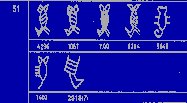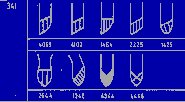Indian Hieroglyphic Dictionary (Set 4)
[based on cluster keys (pictorials) and Indian Lexicon keys (14 sets of lexemic concordance between
image words and tool words)
 m1181 m1181
See the bristles on the face of the squatting person |
mul.ka_
= to squat on heels
mud.uhu = petty chieftain; mwehra_ = image of a village deity maud.a = crown mor.k = to make obeisance
gusa = short hair at the nape of the neck ko_su = king; ko_sur = paik kusal = the beard, awn or bristles of grains and grasses kos, kons = deviation from squareness, straightness koj = spider |
mola =
stake, pin, nail
muggara = army muggara = hammer, club
gusi, ku_cu = crowbar; ku_ysa_ = ploughshare; kusa_ = a hand-implement for turning up clods-- a pole with a metal blade or head; kos = plough; kus'i = ploughshare (See Ur seal decipherment) |
|
mu_Rku =
three
mu_ka = fist
mu_xa_ = frog |
mu_rkkuka = sharpness |
| s'a_ru = ibex | tsaru = handle of sword | |
 m283a m283a |
e_nugu = elephant; ve_r..am, vya_la = elephant | e_ng = sickle; ve_go = sickle |
| rampe = eyelid | rampa = saw | |
|
si_ra =
a line, streak full of stripes sira_ = stream
ciram = top, summit ci_rai = scale-pan |
si_ra =
plough; si_rapa_n.i = epithet of Balarama ci_ra_, s'i_rs.a = helmet; zi_ra_h = armour, coat of mail |
| veggal.a = a superior man | ||
 h97 h97
|
bahula_
= pleiades
pakha_li_ = a water-carrier carrying in leather bags vaho_la = stream |
va_holo = adze; vahola_ = mattock |
 m304a m304a
|
kon~cu
= mane
kun~cu =skein; kuci = fringe of garment
kur..a = a tong
dhaul = bull with one horn
kan.t.le = double-bag of a beast kan.t.ha_la = boat
kan.d.hli_ = ring round the neck; necklace of beads (See the rings on the neck of the bull) kogoo = horn
kun~ja = arbour, place overgrown with creepers or plants
vaguli = fish
vahur.o = young bullock ver.ha_ = octopus said to be found in the Indus river |
khun~j
= crowbar;
kucu, kur..a = ploughshare; kud.a, kur..a, gur..a = simple iron
scraper, a flat plate, used for the kun.t.e; a staff-like metal roller used in clearing
cotton from the seed; it is moved by the foot; a rod used in caterizing.
dhauli_ = weeding knife
kan.d.ali = billhook
|
| ka~d.i, ka_n~j = carrying yoke | ga~d.a_s
= fodder cutter gan.d.ra god.d.ali = broad axe |
|
| salle = quail | sala_yisu
= joining of metal cala_kai = spear |
|
| da~_d = bullock | da_ = large knife; da~_t.ro = sickle | |
 Sign
51 variants Sign
51 variants Nd2 Nd2 |
kod.al =
deer kod.el = rat |
god.el = double-axe; kut. = hoe |
 |
khura =
thigh kuracu = hoof |
khuro = head of a spear; kur-at.u, korad.a_, kut.il = tongs |
 m312 m312
|
goraka =
wild buffalo
go_k = to look up
|
gorka = spear; goraka = metal arrow |
|
va_l =
to pare off with a knife
va_l.ai = scabbard fish
va_lu = slope, slant
val. = bangle
val.ai = curve, arch va_l = tail |
va_l. =
sword, balikatti = long sword; kot.uva_l. = battle axe
|
|
xola_ =
tail kolli = fish kole.l = temple in Kota village; koyl. = harvest ko_lam = ornamental design ghun.d.i_ = knot kan.n.i = knot |
xolla_ =
razor; ko_l = sceptre
kot.ir-u, kot.e_ru, kot.il = pincers
kun.t.e = harrow; khu~t.a_ = peg, pin, stake, wedge kan.icci = battle-axe |
| suha_ga_= harrow | suha_n = a tool used by artificers in metals |
| Advertise with us! |
|
|